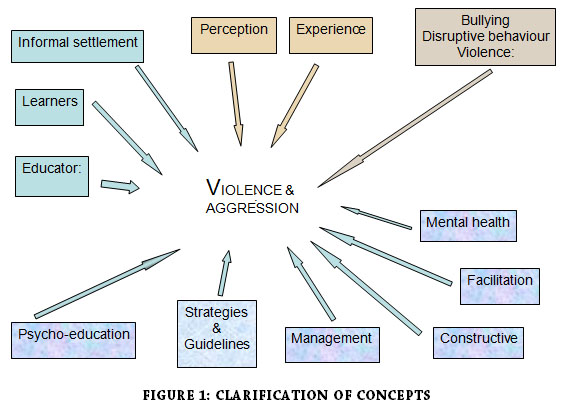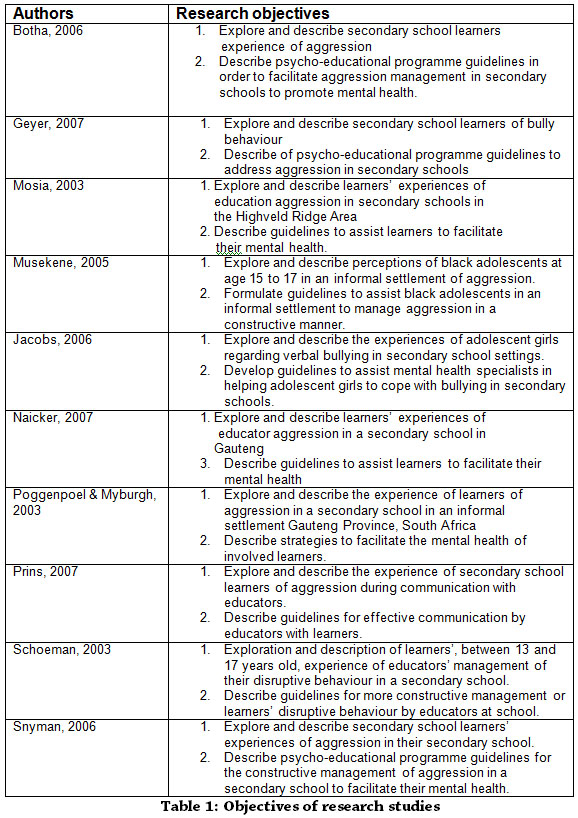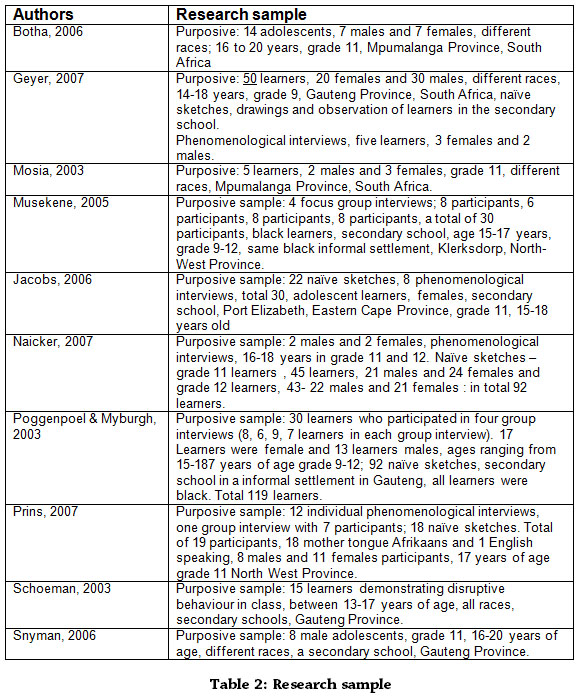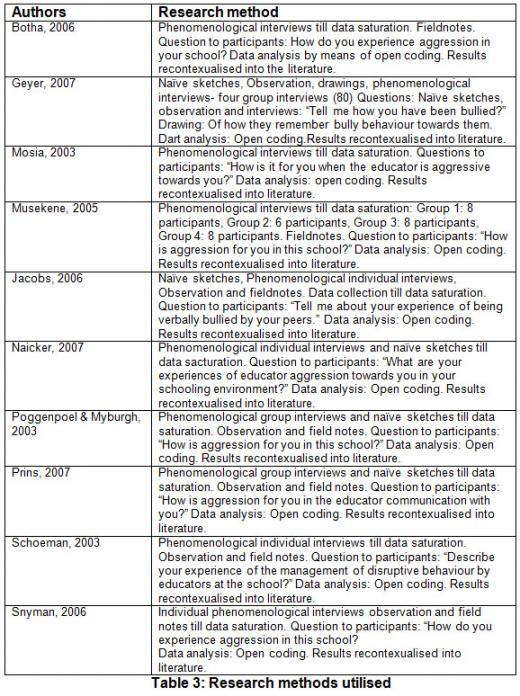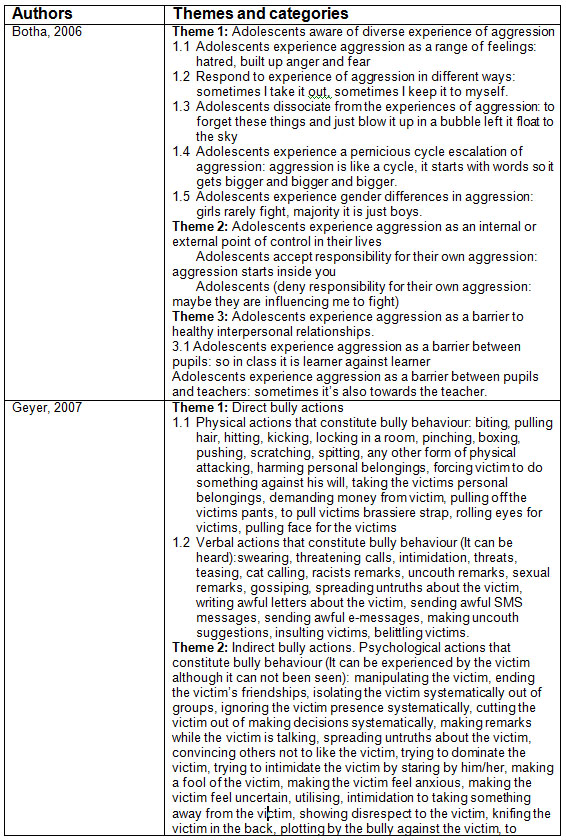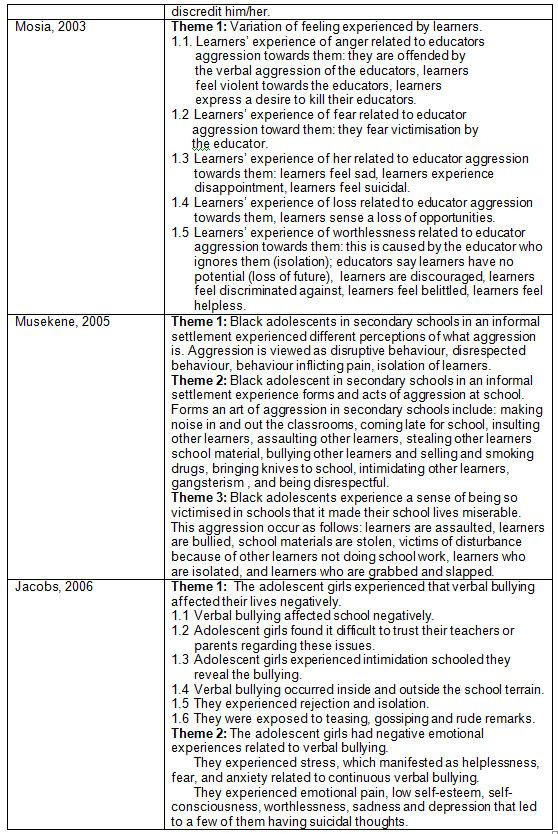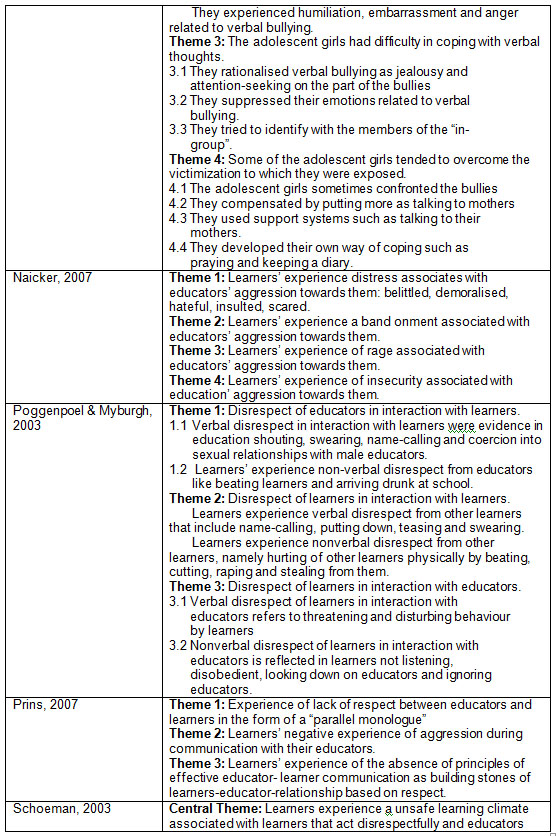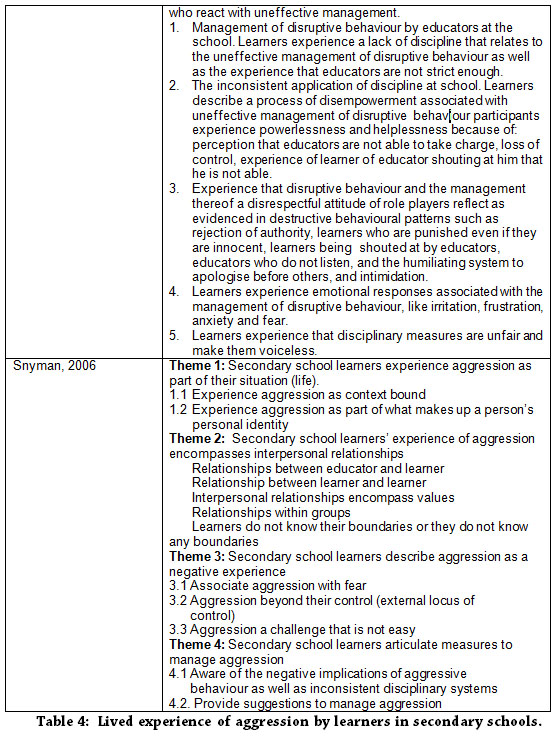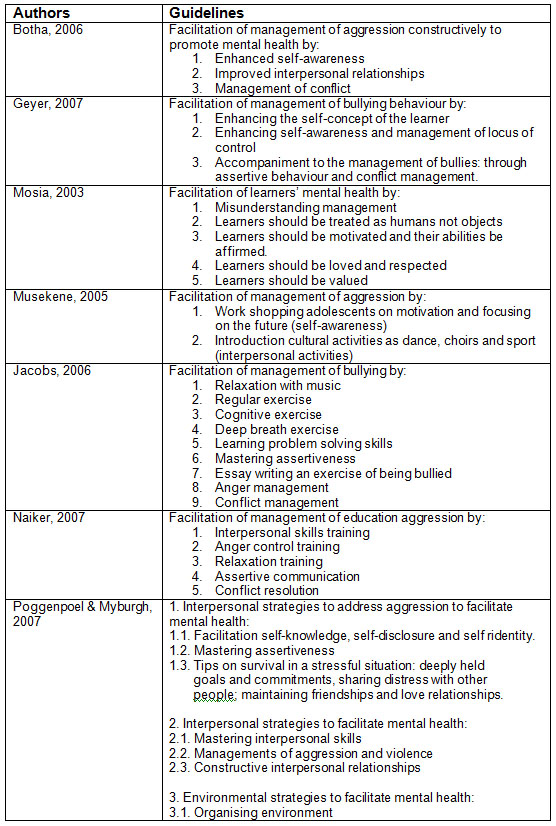Article
| 4 - A meta-synthesis fo completed qualitative research on learners' experience of aggression in secondary schools in South Africa. by M Poggenpoel, Psychiatric Nursing, University of Johannesburg, South Africa CPH Myburgh, Dpt Educational Psychology, University of Johannesburg, South Africa Theme : International Journal on Violence and School, n°8, April 2009 |
| Although meta-synthesis has been published on research conducted by different researchers utilizing different research methods, we have utilized it in our team research project on Iearners’ experience of aggression in secondary schools in South Africa. The objective of this meta-synthesis was to obtain a broader understanding of learners’ experience of aggression in secondary schools in different contexts in South Africa, as well as possible ways to assist learners to address the experienced aggression. More than ten completed research projects were purposively sampled. Data was collected for this meta-synthesis by utilizing the following headings: objectives, sampling, research design, research method, research results and guidelines. The results were placed into tables for each of the headings. After each table a synthesis was provided. At the end of the meta-synthesis process the results of the experience of learners of aggression, and the guidelines for learners to cope with aggression, were depicted in schematic format. |
Keywords : .
| PDF file here.
Click on the title to see the text. BACKGROUND AND RATIONALE Qualitative meta-synthesis has developed as a research method to interpret research on the same or similar phenomena to contribute to the development of knowledge. The outcome of meta-synthesis will contribute to a common understanding of a specific phenomenon. The interpretative synthesis of data often results in novel interpretations of findings from these research studies. Meta-synthesis methods can include constant comparison, taxonomic analysis, and reconceptualization. Meta-synthesis contributes to coming to a point about a specific phenomenon in practice. Phenomena must be understood as contextual and relational. Researchers should acknowledge boundedness within theory and practice. The knowledge claims provided by meta-synthesis should be presented humbly and be assessed by criteria derived from science and art. Meta-synthesis should provide a clear description of the socio-historical context of a specific phenomenon (Thorne, Jensen, Kearney, Noblit & Sandelowski, 2004: 1323-1325; Bondas & Hall, 2007: 115-116; Burns & Grove, 2005: 114-115). Ten research studies were completed between 2002 and 2007 within the project “Aggression in secondary schools”, a National Research of Foundation of South Africa funded project under the leadership of Poggenpoel and Myburgh (2002). These research studies will be meta-synthesized (Poggenpoel & Myburgh, 2007). The socio-historical context in South Africa when this research was conducted was during the years after 1994 the year when the first democratic election took place and is viewed as the post-apartheid era. In this context South African society was exposed to social stress such as high inflation rates, increasing divorce rates, rising suicide and rising mortality rates related to AIDS. This could have contributed to the increasing aggression observed in the society, and especially aggressive behaviour by learners in secondary schools. Learners exposed to such aggression may also expose other persons like their peers, parents, teachers and school managers to aggression and violence. This could be an obstacle to their mental health and their ability to contribute to their society in a productive manner. Research into the phenomenon of aggression in secondary schools could significantly contribute to understanding and developing practical strategies to facilitate mental health in secondary schools (Poggenpoel & Myburgh, 2002). PROBLEM STATEMENT There are possibilities that there is a diversity in learners’ experience and perception of aggression. Already ten research studies have been completed regarding learners’ experience of aggression in secondary schools (Botha, 2006; Geyer, 2007; Mosia, 2003; Musekene, 2005; Jacobs, 2006; Naicker, 2007; Poggenpoel & Myburgh, 2007; Prins, 2007; Schoeman, 2003; Snyman, 2006). The two research questions arising from these completed research studies are: - What common themes can be derived from the results of these studies? - What common guidelines can be derived to assist learners to manage aggression in secondary schools to facilitate their mental health? (Poggenpoel & Myburgh, 2007). OBJECTIVES The two objectives are: - To meta-synthesize 10 research studies on the phenomenon of aggression in secondary schools in South Africa. - To identify common themes in the conducted research, to facilitate the synthesis of the process of theory building regarding the aggression experienced and the constructive management of aggression by secondary school learners. ASSUMPTIONS: CLARIFIED IN META-SYNTHESIS A mentally healthy individual possesses the ability - To make adjustments which enable him/her to remain unhampered by emotional conflict; - To confirm and follow a philosophy of living; - To find satisfaction and fulfilment in exercising and expanding his/her potential; and - To establish and maintain meaningful relationships with others (Kreigh & Perko, 1083:4-7). Mental health involves constructive intrapersonal, interpersonal and environmental relationships (Uys & Middleton, 2004: 753). In the individual’s intrapersonal relationship, Frankl’s (1962; 1967; 1978; 1980 and 1985) “discovery of meaning” is important. Being exposed to aggression poses mental health challenges to an individual, but these challenges can be addressed constructively by realizing: - Each individual has a freedom of choice. An individual is in charge of a situation — a situation is not in charge of the individual. This freedom of choice is value-based; authentic living is only possible if an individual is responsible for his/her own actions. Freedom of choice means that an individual has the opportunity to be selective and choose a certain way of coping that can be constructive or destructive; meaningful or meaningless; or responsible or irresponsible. - Motivation to discover meaning is essential. An individual who is motivated to discover meaning in a challenging situation is also able to cope with the situation. - Attitude when confronted with a challenging situation is important. Constructive coping with a challenging situation depends on the attitude that an individual adopts towards a situation that cannot be changed. This attitude is positive when there is: o An understanding that an individual that assists others is a positive way of coping with a challenging situation; o An understanding that the love of God and one’s fellow human beings ought to direct one’s actions; and o An understanding that one can choose to take a positive stand in an unalterable situation (Poggenpoel, 1997: 142-147). A mentally healthy individual demonstrates in interpersonal relationships: the ability to establish and maintain positive relationships; responsibility for terminating those relationships which may be viewed as harmful; validation of feeling; collaboration; acceptance of compromises; direct communication; and the use of body language to facilitate communication and respect for others. In relation to the environment, a mentally healthy individual has the ability to: organize the environment; exert control over or modify the immediate environment; adapt to change; engage in planned thoughtful responsible activity; and resolve power struggles by means of cooperation and compromise (Poggenpoel & Myburgh, 2007). In the next section the concepts used in the various projects are identified and clarified for the meta-syntheses that will follow. CLARIFICATION OF CONCEPTS Different concepts were utilized in the research studies (See Figure 1). They will be defined and then combined. a) Experience is any event through which an individual has lived, has gained knowledge from such participation in that event and the sum total of knowledge he/she accumulated. Experience involves personal knowledge, personal involvement and first hand knowledge and exposure (Johnson, 1997:21) b) Perception is a product of a secondary encounter with objects and events. It involves the processing and interpretation of the sensory input (Hartup, 1994:43). c) The term learners in this meta-synthesis refers to secondary school learners who receive education from a teacher (Potgieter, Visser, Van der Bank, Mothata & Squelch (1997:vi). d) Teacher: A teacher is somebody who is trained in teaching in a school situation. A teacher is somebody who takes responsibility for the learners up to adulthood and somebody who is expected to know more than the one who is led (Fraser, Laubser & Van Rooy, 1999:5). e) Facilitation: Facilitation is a process to enable things to happen such as helping people to identify the cause of the problem, as well as solutions’ in order to simplify matters, actions or process, to identify goals and objects, and to improve work effectiveness (Meyer, 2004:24). f) Management refers to the process of managing. To manage means to be in charge of, administer and regulate, succeed in doing or dealing with, succeed despite difficulties, cope (The Readers Digest Word Power Dictionary, 2002:587). g) Informal settlement: This is a community without formal structure such as running water, electricity, tar roads and build houses. h) Guidelines: Guidelines are directions on how to manage a situation (The Oxford Thesaurus, 1991: 187). i) Strategies: Strategies are a set of principles put forward to determine a or to chart a course of action (Hanks, 1979: 650). j) Psycho-education: This refers to the education and training of people in the psychological which are thought to be relevant to their mental health. It is a helping strategy that provides psychological guidance to individuals and teaches them about their emotional and relationship functioning by means of didactic teaching (Okum, 1997:1832, 290). k) Constructive means helpful, useful, beneficial and positive (The Oxford Thesaurus, 1991: 70). l) Aggression: aggression implies the intent to harm or otherwise injure another person, an implication from events preceding or following the act of aggression (Kaplan and Sadock, 1997:154). Verbal aggression refers to spoken words or verbal statements that are motivated by anger. Verbal aggression refers to verbal behaviours used to express aggression (Hawkins, 1998:496). Physical aggression involves hitting, punching, kicking and the use of weapons by an individual towards their victims (Baron and Byrne, 1994:464). m) Bullying: This is the activity that occurs when a weaker person is being hurt, intimidated or persecuted by a stronger person (Collin’s Dictionary and Thesaurus, 2005:17). Verbal bullying included name-calling, threatening gestures, stalking behaviour and malicious phone calls to the individual’s house, repeatedly hiding someone’s belongings, leaving people out of desired activities and spreading rumours about someone (Rigby, 2000:20). Physical bullying includes attacks on the victim, kicking, hitting or slapping (Baumeister, Smart & Bodem, 1996:5). Bullying consists of four essential elements: the behaviour is aggressive and negative; it is carried out repeatedly; the behaviour is a relationship where there is an imbalance of power between parties involved; and the behaviour is purposeful (http://en.wikipedia/org/iki/bully). n) Disruptive behaviour includes talking out of turn, hindering other pupils, making unnecessary noises, calculated idleness or work avoidance, not being punctual and getting out of a seat without permission (Charlton & Kenneth, 1993: 8). o) Violence: Violence is to inflict harm, damage and injure (The Oxford Thesaurus, 1991: 538). In this meta-synthesis the above clarified concept definitions related to experiences of aggression that will be utilized in the further discussion are perception; facilitation that will include management; strategies that will include guidelines and psycho-education; and aggression that will include bullying, disruptive behaviour and violence (Poggenpoel & Myburgh, 2007). RESEARCH METHODOLOGY SAMPLING The criterion regarding the selection of studies includes studies from peer reviewed journals and unpublished dissertations. The recommendation is that at least ten to twelve studies should be purposively included in the meta-synthesis to create a meaningful and valid meta-synthesis (Bondas & Hall, 2007: 117). One peer reviewed article had been published (Poggenpoel & Myburgh, 2006: 70-90) and several dissertations were included in this meta-synthesis. DATA COLLECTION According to Bondas and Hill (2007: 117) systematic attention should be paid to each of the studies that have been included in the meta-synthesis. Data collection forms suitable to support data analysis can be developed (Bondas & Hall, 2007: 118). The following data collection forms were utilized in this meta-synthesis: - objectives; - sampling; - research design; - research methods; - research results: Experience of aggression by learners in secondary schools; and - guidelines (Poggenpoel & Myburgh, 2007). DATA ANALYSIS Synthesis is achieved by maintaining the central concepts of each study and comparing them to other key concepts in the results. Researchers have the potential to interpret the strengths and limitations of the study and to provide alternatives. Fittingness is reached when the meta-synthesis findings can fit into other contexts as well as reflect elements of life experiences (Bondas & Hall, 2007: 118). RECONTEXTUALIZATION INTO THE LITERATURE The description of mental health as being a relationship, simultaneously an intrapersonal, an interpersonal and an environmental relationship was utilized to recontextualize the results within the literature (Poggenpoel & Myburgh, 2007). APPLICATION OF ETHICAL PRINCIPLES The studies that are included in the metasynthesis need to be ethically analysed and referred to (Bondas & Hall, 2007: 120). VALIDITY “The criteria of clarity, structure, coherence, scope, generalizability and pragmatic utility are proposed for all qualitative research” (Bondas & Hall, 2007: 118). Bondas and Hall (2007: 119) identify criteria of validity as involving the following questions. Does the report clarify and resolve rather than observe inconsistencies or tensions between materials synthesized? Does a progressive problem shift result? Is the synthesis consistent, parsimonious, elegant, fruitful, and useful? Is the purpose of the meta-analysis explicit? And: Are the research questions clearly stated? The inclusion criteria procedures for data collection, description of the sample, and the methods for data analysis and interpretation should be clear (Bondas & Hall, 2007: 119). These questions have been addressed during the meta-synthesis process reflected in this paper. RESULTS The headings utilized in the data collection forms are utilized to describe the results of the meta-synthesis. OBJECTIVES OF RESEARCH STUDIES In Table 1 the objectives of the ten studies are described. All ten research studies had two overall objectives which were: - to explore and describe learner experiences of aggression in secondary schools; and - to describe strategies to facilitate true management of aggression by learners to promote their mental health (Poggenpoel & Myburgh, 2007). RESEARCH SAMPLE REALIZATION In Table 2 the research studies’ research sample realizations are provided. All the research utilized purposive sampling till data-saturation was demonstrated as evidence in repeating themes. The participants ranged from 13-20 years of age, were in grade 9-12; different races; and males and females. They came from different provinces in South-Africa: Gauteng: North-West; Mpumalanga and Eastern Cape; formal settlements and informal settlements. All were learners in public secondary schools. In total 386 learners participated in the ten research studies (Poggenpoel & Myburgh, 2007). RESEARCH DESIGN Qualitative, explorative, descriptive and contextual designs were utilized in the research studies. RESEARCH METHOD In Table 3 the research methods of the different studies are reflected. Two phases were used during the implementation of the research method. In phase one a field study was conducted, and in phase two guidelines were derived from the results of phase one. Phenomenological interviews were utilized as the primary method of data collection. These interviews were conducted individually and in groups. Naïve sketches were also utilized to elicit experience of aggression in secondary schools by learners. Observation and field notes were kept. The question that was posed to learners was: “How is aggression in this school?” This overall question focused on teacher - learner aggression and learner - learner aggression. All researchers utilized open coding and the learners’ results were recontextualized into the literature. All the researchers applied measures to ensure trustworthiness and ethical principles. GUIDELINES WERE DERIVED BASED ON THE RESULTS OF THE PHENOMENOLOGICAL INTERVIEWS, NAÏVE SKETCHES, AND FIELD NOTES (POGGENPOEL & MYBURGH, 2007). Research results from phase 1: Lived experience of aggression by learners in secondary schools In Table 4 the results of phase 1 of the studies are presented. A meta-synthesis of learners’ experience of aggression in secondary schools: Learners’ experience of aggression include learner to learner aggression; learner to educator aggression; and educator to learner aggression. When interpreting the results of learners’ experience of aggression in secondary schools, it becomes clear that learners face challenges to their mental health. The learners’ experience of aggression in secondary schools results in challenges to their mental health as reflected in their intrapersonal, interpersonal and environmental relationships (Kreigh & Perko: 5-6). These mental health challenges resulting from learners’ experience of aggression are described in the following discussion. Learners’ intrapersonal experiences of aggression - These experiences include negative feelings, negative perceptions, and negative ideas as the utilization of defense mechanisms. Negative feelings of learners resulting from their experience of aggression are anger, hatred, outrage, violence, humiliation and rage; sadness (hurt, sad, disappointed, discouraged feelings, worthlessness and depression), and fear (scared). - Negative perceptions of learners resulting from their experience of aggression are loss of opportunities, feelings of helplessness and poor self-concept and self-esteem. - Negative ideas of learners resulting from their experience of aggression are suicidal ideas, being demoralized, poor boundaries. - Learners’ utilization of defense mechanisms as result of aggression experienced are repression of own inner feelings, the rationalization about other individuals’ aggression and denying responsibility for own behaviour. These are defense mechanisms learners (Poggenpoel & Myburgh, 2007). Learners’ interpersonal experience of aggression These experiences include the experience of aggression as physical actions, verbal actions and indirect actions; aggression experienced as disrespect and learners’ reaction on aggression. - Aggression experienced as physical actions takes the form of physical actions experienced as biting, pulling hair, kicking, hitting, pinching, pushing, scratching, spitting, destroying personal property, coercion for sex, rolling eyes and pulling face. - Aggression experienced as verbal actions takes the form of actions experienced as swearing, threatening calls, intimidation, threats, teasing, cat calling, racist remarks, sexual remarks, gossiping, spreading untruths, sending awful sms’, sending insulting letters, sending awful e-mails, making insulting and belittling remarks. - Aggression is experienced as indirect actions. These indirect actions are experienced as manipulation, ending of other learners friendships, isolating, ignoring, cutting out of decision-making, making rude remarks during conversations, intimidating, dominating, mocking, provoking anxiety, making noise inside and outside the classroom, coming late for school, selling and using drugs, gangsterism, weapons and not doing schoolwork. - Aggression is experienced as disrespect. This disrespect is experienced by learners as being beaten by educators; educators arriving drunk at work and parallel monologue between learners and educators during which learners are not listened to by educators. - Learners’ reaction to aggression experienced can take the form of aggression by acting out and fighting; learners experience barriers between learner-learner and learner-educator (Poggenpoel & Myburgh, 2007). Learners’ environmental relationship experience of aggression Learners exposed to aggression experience distrust towards educators and parents; their schoolwork is negatively affected; they experience an unsafe learning climate; as well as lack of discipline and inconsistent application of discipline. - Learners experience distrust towards educators and parents as result of their experience of aggression. Learners think that adults will not be able or willing to assist them to address aggression. - Learners’ schoolwork is negatively affected by their experience of aggression. Learners are pre-occupied because of their negative feelings, ideas and reactions as a result of experienced aggression. - Learners experience the school learning climate as unsafe as a result of their experienced aggression. Learners experience that other learners are acting disrespectfully to educators and learners by threatening and disturbing behaviour; not listening; acting disobediently, and they also see that educators react with ineffective management of learners. - Learners experience the application of inconsistent discipline by educators has as having a disempowering effect in the school. Educators are not able to take charge and there is a loss of control in the school. Research results from phase 2: Guidelines to assist learners to manage aggression in a secondary school In Table 5 the results of phase 2 of the studies are presented. Guidelines to assist learners to manage aggression in a secondary school are suggested. Through this learners are assisted to facilitate their mental health. These guidelines are derived from the results of phase 1. Experiential learning is utilized as an educational approach. Facilitation of healthy intrapersonal relationships of learners can be achieved by: - enhancing a positive self-concept of the learner by facilitating self- awareness, self-identity, self-knowledge and self-disclosure; - mastering stress management through deep breathing exercises; relaxation with music; regular exercises, cognitive reframing; problem solving skills and tips on survival; - taking responsibility for own behaviour, internal locus of control; and - demonstrating consistent behaviour (Poggenpoel & Myburgh, 2007). Facilitation of healthy interpersonal relationships of learner can be achieved by: - mastering interpersonal skills such as listening, hearing, open verbal and non-verbal communication; and attitudes such as respect, empathy and unconditional acceptance of other people; - building and maintaining healthy interpersonal relationships; - managing of conflict; - mastering assertive behaviour (Poggenpoel & Myburgh, 2007). Facilitation of healthy environmental relationships of learners comes about through: - engaging in planned, thoughtful activity; - organizing the environment; and - managing change (Poggenpoel & Myburgh, 2007). CONCLUSIONS AND RECOMMENDATIONS In this meta-synthesis common themes in learners’ experience of aggression and guidelines were utilized in the ongoing process of theory building. During the meta-synthesis, clarification of the consistency between the material synthesized was assessed. The synthesis was consistent, parsimonious, fruitful and useful. The objectives of the meta-synthesis were stated explicitly. The research questions were clearly stated. The inclusion criteria procedures for data collection, sample description and methods for data analysis and interpretation were clearly presented. RECOMMENDATIONS Recommendations with regards to practice, research and education are made: - Practice: Educators need to be workshopped on the constructive management of aggression in secondary schools. - Research: Further research need to be conducted on educators’ experience of aggression in secondary schools. - Education: Policy makers in education should be sensitized to manage aggression in secondary schools. |
Bibliography
BARON, RA & BYRNE, D (1994), Social Psychology: Understanding Human Interactions. Massachusetts, USA.
BAUMEISTER, RF, SMART, L & BODEN, JMI (1996), Relation of threatened egotism to violence and aggression: the dark side of high self-esteem. Psychological Review, 103: 5-33.
BONDAS, T & HALL, EOC (2007), Challenges in approaching metasynthesis research. Qualitative Health Research, 17(1): 113-121.
BOTHA, AJ (2006), The facilitation of aggression management in secondary schools in Mpumalanga. D.Ed. Psychology of Education Thesis, University of Johannesburg.
BURNS, N & GROVE, SK (2005), The practice of nursing research. Conduct, critique and utilization. Philadephia: WB SAUNDERS.
CHARLTON, T & KENNITH, D (1993), Managing misbehaviour in schools. New York: Routledge.
Collin’s Dictionary and Thesaurus (2005), Great Britain: Harper Collins Publisher.
FRANKL, VE (1963), Man’s search for meaning: An introduction to Logo Therapy. New York: Simon & Schuster.
FRANKL, VE (1967), Psychotherapy and existentialism. New York: Washington Square Press.
FRANKL, VE. (1978), The unheard cry for meaning: Psychotherapy and humanism. New York: Washington Square Press.
FRANKL, VE. (1980), Sê ja vir die lewe (Say yes to life). Kaapstad: Tafelberg.
FRANKL, VE. (1985), The unconscious God. New York: Washington Square Press.
FRASER, WJ; Loubser, CP; Van Rooy, MP (1990), Didactics for the undergraduate student. Durban: Butterworth.
GEYER, JM (2007), ‘n Psigo-opvoedkundige program vir die aanspreek van boeliegedrag by sekondêre leerders. (A psycho-educational programme to address bullying demonstrated by secondary school learners). D.Ed Psychology of Education Thesis, University of Johannesburg.
HARTUP, WW (1994), Determinants of behavioural development. Pretoria: Academic Press.
HAWKINS, JM (1998), The South African Oxford School Dictionary, Cape Town: Oxford University Press.
JACOBS, R (2006), The experience of adolescent girls regarding verbal bullying in secondary schools. M.Cur Psychiatric Nursing Mini-dissertation, Nelson Mandela Metropolitan University.
JOHNSON, DW (1997), Reaching out: Interpersonal effectiveness and self-actualization. Boston: Allyn & Bacon.
KAPLAN, HI & SADOCK, BJ (1997), Kaplan and Sadock’s Synopsis of Psychiatry. Maryland, USA: William & Wilkus.
KREIGH, HZ & PERKO, JG (1983), Psychiatric and mental health nursing: a commitment to care and concern. Reston, Virginia: Reston.
MEYER, M (2004), Effective facilitation: practical guidelines and trainers. Claremont: New Africa Education.
MOSIA, DE (2003), Learners’ experience of education aggression in the secondary schools in the Highveld Ridge Area. M.Ed Psycho-educational programme development, Rand Afrikaans University.
MUSEKENE, NA (2005), The perceptions of black adolescents of aggression. M.Ed Psychology of Education Mini-dissertation, University of Johannesburg.
NAICKER, A (2007), Learners’ experience of educator aggression in a secondary school in Gauteng. M.Ed Psychology of Education Dissertation, University of Johannesburg.
OKUN, BF (1997), Effective helping: interviewing and counseling techniques. California: Brooks Cole.
POGGENPOEL, M (1997), Discovery of meaning in a crisis as a critical factor in an individual’s ability to cope with a crisis constructively.(pp. 142-147) In Crouse, F, Havenga, HA, Coetzer, AA & Van den Heever, L (Ed) (1997), On the way to meaning. Essays in rememberance of Victor Frankl. Benmore South Africa: Victor Frankl Institute.
POGGENPOEL, M & MYBURGH, CPH (2007), Lived-experience of aggression in secondary schools in South Africa Education 123 (1): 161-166
POGGENPOEL, M & MYBURGH, CPH (2007), The lived-experience of aggression in secondary schools in South Africa: a meta-synthesis of completed qualitative research 2002-2007. Paper delivered at the international conference for Qualitative Research Methodology, Banff, Canada, 22 September 2007.
POGGENPOEL, M & MYBURGH, CPH (2006), Mental health challenges of educators concerning the experience of violence in the secondary school setting. International Journal on Violence and School. Volume 2: 70-90.
POTGIETER, JM; VISSER, PJ, VAN DER BANK, AJ; MOTHATA, MS & SQUELCH, JM (1997), Understanding the SA Schools Act: What public schools governors need to know. Pretoria: Department of Education.
PRINS, JS (2007), Sekondêre skool leerders se belewenis van aggressie tydens kommunikasie met hulle onderwysers. (Secondary school learners’ experience of aggression during communication with their teachers) M.Ed Psychology of Education Dissertation, University of Johannesburg.
RIGBY, K (2002), New perspectives on bullying. London: Jessica Kingsley Publishers.
SCHOEMAN, S (2003), ‘n Psigo-opvoedkundige perspektief oor die handtering van leerders se onbeheerbare gedrag. (A psycho-educational perspective on the management of disruptive behaviuor by learners) M.Ed Psychology of Education Minor-dissertation, Randse Afrikaans University.
SNYMAN, MV (2006), The development of a psycho-educational programme for adolescents who experience aggression in a secondary school. D.Ed Psychology of Education Thesis, University of Johannesburg.
The Oxford Thesaurus (1991), Oxford: Clarendon Press.
The Reader’s Digest Word Power Dictionary, (2002), London: Oxford University Press.
THORNE, S, JENSIN, L, Kearney, MH, Noblit, G & Sandelowski, M (2004), Qualitative metasynthesis: Reflections on methodological orientation and ideological agenda. Qualitative Health Research 14(10): 1342-1365.
UYS, LR & MIDDLETON, L (2004), Mental Health Nursing: a South African Perspective. Cape Town: Juta.
Wikipedia Encyclopedia. Bully (2006), http://en.wikipedia/org/wiki/bully (accessed 5 January 2006).
BAUMEISTER, RF, SMART, L & BODEN, JMI (1996), Relation of threatened egotism to violence and aggression: the dark side of high self-esteem. Psychological Review, 103: 5-33.
BONDAS, T & HALL, EOC (2007), Challenges in approaching metasynthesis research. Qualitative Health Research, 17(1): 113-121.
BOTHA, AJ (2006), The facilitation of aggression management in secondary schools in Mpumalanga. D.Ed. Psychology of Education Thesis, University of Johannesburg.
BURNS, N & GROVE, SK (2005), The practice of nursing research. Conduct, critique and utilization. Philadephia: WB SAUNDERS.
CHARLTON, T & KENNITH, D (1993), Managing misbehaviour in schools. New York: Routledge.
Collin’s Dictionary and Thesaurus (2005), Great Britain: Harper Collins Publisher.
FRANKL, VE (1963), Man’s search for meaning: An introduction to Logo Therapy. New York: Simon & Schuster.
FRANKL, VE (1967), Psychotherapy and existentialism. New York: Washington Square Press.
FRANKL, VE. (1978), The unheard cry for meaning: Psychotherapy and humanism. New York: Washington Square Press.
FRANKL, VE. (1980), Sê ja vir die lewe (Say yes to life). Kaapstad: Tafelberg.
FRANKL, VE. (1985), The unconscious God. New York: Washington Square Press.
FRASER, WJ; Loubser, CP; Van Rooy, MP (1990), Didactics for the undergraduate student. Durban: Butterworth.
GEYER, JM (2007), ‘n Psigo-opvoedkundige program vir die aanspreek van boeliegedrag by sekondêre leerders. (A psycho-educational programme to address bullying demonstrated by secondary school learners). D.Ed Psychology of Education Thesis, University of Johannesburg.
HARTUP, WW (1994), Determinants of behavioural development. Pretoria: Academic Press.
HAWKINS, JM (1998), The South African Oxford School Dictionary, Cape Town: Oxford University Press.
JACOBS, R (2006), The experience of adolescent girls regarding verbal bullying in secondary schools. M.Cur Psychiatric Nursing Mini-dissertation, Nelson Mandela Metropolitan University.
JOHNSON, DW (1997), Reaching out: Interpersonal effectiveness and self-actualization. Boston: Allyn & Bacon.
KAPLAN, HI & SADOCK, BJ (1997), Kaplan and Sadock’s Synopsis of Psychiatry. Maryland, USA: William & Wilkus.
KREIGH, HZ & PERKO, JG (1983), Psychiatric and mental health nursing: a commitment to care and concern. Reston, Virginia: Reston.
MEYER, M (2004), Effective facilitation: practical guidelines and trainers. Claremont: New Africa Education.
MOSIA, DE (2003), Learners’ experience of education aggression in the secondary schools in the Highveld Ridge Area. M.Ed Psycho-educational programme development, Rand Afrikaans University.
MUSEKENE, NA (2005), The perceptions of black adolescents of aggression. M.Ed Psychology of Education Mini-dissertation, University of Johannesburg.
NAICKER, A (2007), Learners’ experience of educator aggression in a secondary school in Gauteng. M.Ed Psychology of Education Dissertation, University of Johannesburg.
OKUN, BF (1997), Effective helping: interviewing and counseling techniques. California: Brooks Cole.
POGGENPOEL, M (1997), Discovery of meaning in a crisis as a critical factor in an individual’s ability to cope with a crisis constructively.(pp. 142-147) In Crouse, F, Havenga, HA, Coetzer, AA & Van den Heever, L (Ed) (1997), On the way to meaning. Essays in rememberance of Victor Frankl. Benmore South Africa: Victor Frankl Institute.
POGGENPOEL, M & MYBURGH, CPH (2007), Lived-experience of aggression in secondary schools in South Africa Education 123 (1): 161-166
POGGENPOEL, M & MYBURGH, CPH (2007), The lived-experience of aggression in secondary schools in South Africa: a meta-synthesis of completed qualitative research 2002-2007. Paper delivered at the international conference for Qualitative Research Methodology, Banff, Canada, 22 September 2007.
POGGENPOEL, M & MYBURGH, CPH (2006), Mental health challenges of educators concerning the experience of violence in the secondary school setting. International Journal on Violence and School. Volume 2: 70-90.
POTGIETER, JM; VISSER, PJ, VAN DER BANK, AJ; MOTHATA, MS & SQUELCH, JM (1997), Understanding the SA Schools Act: What public schools governors need to know. Pretoria: Department of Education.
PRINS, JS (2007), Sekondêre skool leerders se belewenis van aggressie tydens kommunikasie met hulle onderwysers. (Secondary school learners’ experience of aggression during communication with their teachers) M.Ed Psychology of Education Dissertation, University of Johannesburg.
RIGBY, K (2002), New perspectives on bullying. London: Jessica Kingsley Publishers.
SCHOEMAN, S (2003), ‘n Psigo-opvoedkundige perspektief oor die handtering van leerders se onbeheerbare gedrag. (A psycho-educational perspective on the management of disruptive behaviuor by learners) M.Ed Psychology of Education Minor-dissertation, Randse Afrikaans University.
SNYMAN, MV (2006), The development of a psycho-educational programme for adolescents who experience aggression in a secondary school. D.Ed Psychology of Education Thesis, University of Johannesburg.
The Oxford Thesaurus (1991), Oxford: Clarendon Press.
The Reader’s Digest Word Power Dictionary, (2002), London: Oxford University Press.
THORNE, S, JENSIN, L, Kearney, MH, Noblit, G & Sandelowski, M (2004), Qualitative metasynthesis: Reflections on methodological orientation and ideological agenda. Qualitative Health Research 14(10): 1342-1365.
UYS, LR & MIDDLETON, L (2004), Mental Health Nursing: a South African Perspective. Cape Town: Juta.
Wikipedia Encyclopedia. Bully (2006), http://en.wikipedia/org/wiki/bully (accessed 5 January 2006).
Read also
> Summary
> 1 - Pour une approche contextuelle de la violence. Le rôle du climat d'école.
> 2 - Violences sportives, milieux sociaux et niveaux scolaires. Distribution "socioculturelle" des formes de violence dans le champ des pratiques sportives de terrain.
> 3 - Réflexions phénoménologiques sur le sens de la violence scolaire au Chili.
> 5 - Managing and handling indiscipline in schools. A research project.
<< Back
